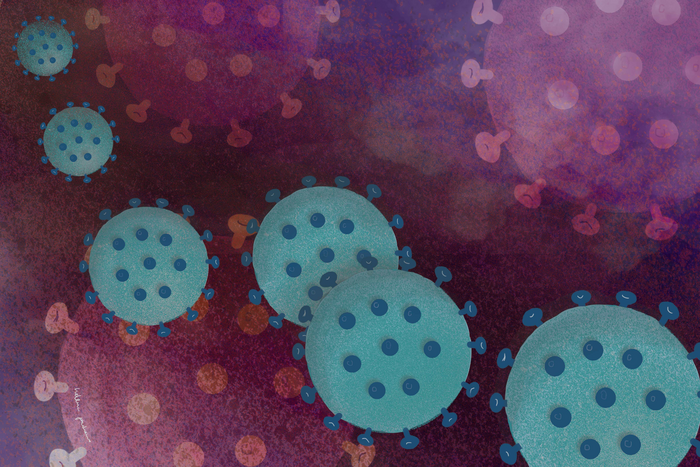Vaccinated people who were infected by the first Omicron subvariants have four times greater protection than vaccinated people who were not infected. These results are part of a study that will be published today in the prestigious scientific journal New England Journal of Medicine*.

Credit: Helena Pinheiro, iMM
Vaccinated people who were infected by the first Omicron subvariants have four times greater protection than vaccinated people who were not infected. These results are part of a study that will be published today in the prestigious scientific journal New England Journal of Medicine*.
The study published now was led by Luís Graça, group leader at the Instituto de Medicina Molecular João Lobo Antunes (iMM) and Full Professor at the Faculty of Medicine of the University of Lisbon, and by Manuel Carmo Gomes, Associate Professor with Aggregation at the Faculty of Sciences of the University of Lisbon (Ciências ULisboa). Both researchers are members of the Technical Commission on Vaccination against COVID-19 (CTVC) of the Direção Geral de Saúde (DGS).
This is one of the first studies worldwide to analyze the probability of becoming infected with the subvariant currently in circulation in vaccinated people, by estimating the degree of protection conferred by infections with previous variants and using real-world data.
“Vaccinated people who were infected by Omicron subvariants BA.1 and BA.2 have a protection against infection with subvariant BA.5, in circulation since June, about four times greater than vaccinated people who were not infected at any time. ”, starts explaining Luís Graça, co-leader of the study. “Infections in 2020 and 2021 that occurred through infection with earlier variants of the SARS-CoV-2 virus (ancestral lineage, Alpha and Delta variants) also confer protection against infection for the more recent Omicron variant, although this protection is not as high as that of individuals infected with the BA.1 and BA.2 variants, at the beginning of 2022”, reinforces Luís Graça.
“These results are very important because the adapted vaccines that are in clinical development and evaluation are based on the BA.1 subvariant of the virus, which was a dominant variant in infections in January and February 2022. Until now, it was not known what degree of protection this subvariant provides against the subvariant that is currently in circulation. These results show that this protection is very significant and allows us to anticipate the benefit of the adapted”, adds Luís Graça on the relevance of the study.
To carry out this study, the researchers had access to the registry of COVID-19 cases at Portugal’s national level. “We used the Portuguese national registry of COVID-19 cases to obtain information on all cases of SARS-CoV-2 infections in the population over 12 years of age residing in Portugal. The virus variant of each infection was determined considering the date of infection and the dominant variant at that time. We considered the infections caused by the first variants of Omicron BA.1 and BA.2 together”, explains Manuel Carmo Gomes. “With these data, we analyzed the probability of a person that was previously infected to be reinfected with the current variant, which allowed us to calculate the percentage of protection provided by previous infections”, explains João Malato, PhD student in Luís Graça’s group and first author of the study.
“This study demonstrates, in the period of time analysed, that previous infection in vaccinated people (the so-called hybrid immunity) continues to confer for the variants that are known for their ability to evade the immune response, such as the subvariant currently dominant”, emphasizes Válter Fonseca, co-author of this study. and coordinator of the CTVC of the DGS.
This work was carried out at the iMM and the Centro de Estatística e Aplicações da Universidade de Lisboa from the Faculty of Sciences of the University of Lisbon, in collaboration with the DGS. This work was funded by the European Union Horizon 2020 Research and Innovation program, the Fundação para a Ciência e a Tecnologia (FCT, Portugal), and the National Institute of Health.
*João Malato, Ruy M. Ribeiro, Pedro Pinto Leite, Pedro Casaca, Eugénia Fernandes, Carlos Antunes, Válter R. Fonseca, Manuel Carmo Gomes, Luis Graça (2022) Risk of BA.5 infection in individuals exposed to prior SARS-CoV-2 variants. NEJM. DOI: https://doi.org/10.1101/2022.07.27.22277602
Journal
New England Journal of Medicine
DOI
10.1101/2022.07.27.22277602
Method of Research
Observational study
Subject of Research
People
Article Title
Risk of BA.5 infection in individuals exposed to prior SARS-CoV-2 variants
Article Publication Date
31-Aug-2022




